We quit Monrovia once we leave 20 USD to the immigration bureau, for what feels like an extorted extension of our 3-month visa, happening according to mysterious rules. Monrovia is the best place so far for money extortion through poor service and poor quality. A normal sized pizza costs 17 USD. I have seen the Nikon camera kits of the D90 and D5000 at respectively 2200 USD and 1550 USD, which is twice the highest price found online.
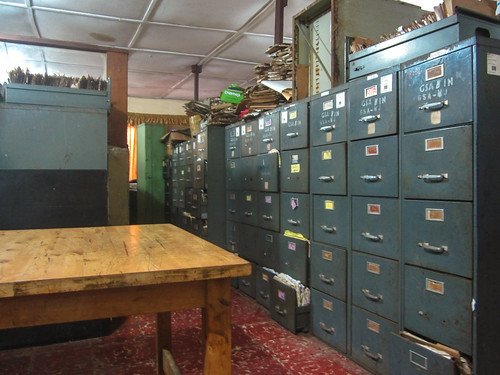
That cannot go without Chop My Money. I don’t know how popular it has been in Europe, but I have been hearing this song in almost every city since The Gambia.
A few minutes before leaving, already late in the day, I break the valve of the rear tire while pumping it up. Deflated tires were a sign of having stayed too long in Monrovia, and now, with the time to change the inner tube, we are good to stay for another day.
This false start gives us the chance to meet Henrik for dinner and spend more time with the great people of the Swedish Embassy.
After an unsuccessful Magura brake bleed to improve the pressure in the lever, the first sight on the road east of Monrovia is the former Ministry of Defense, another big and beautiful ruined building.
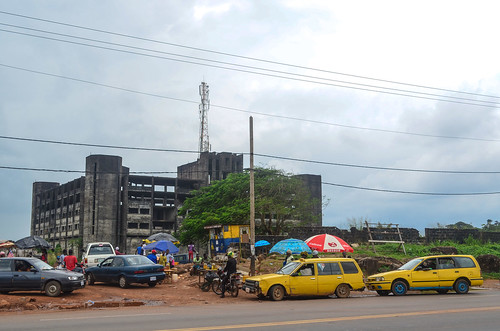

We head up straight along the coastline to the Firestone rubber plantation, one day cycling away from the capital.
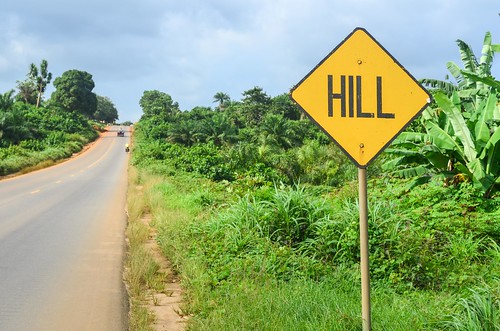
On the rather busy secondary road to the airport, we have lunch in Duazon next to one of the many UNMIL military camp. The road is uneventful and we reach the airport when a plane lands over us with noise. Just there begins the Firestone plantation, the so called world biggest rubber plantation.

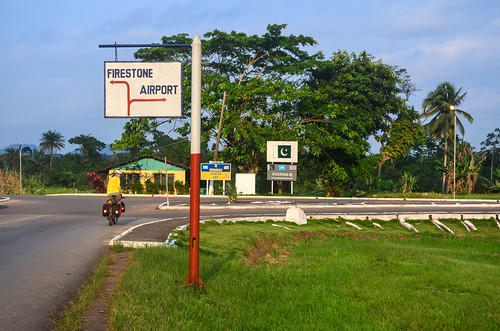
The roads into the plantation are guarded with checkpoints and passport check. We reach Harbel, the “capital village” of Firestone, named after the founder and his wife Harvey and Idabelle Firestone. The plantation is so big it takes a considerable part of the country, and some national roads cross through it.
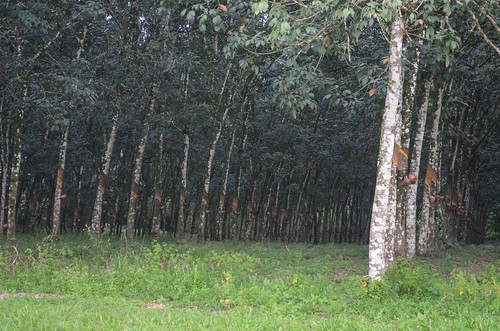
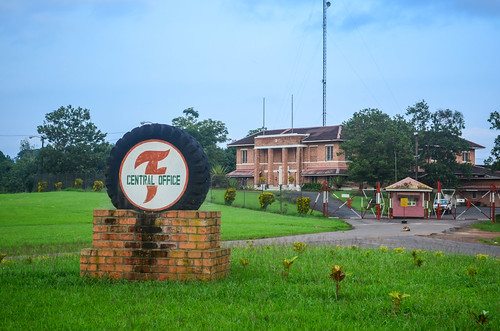

I meet at the plant with Stephen Tolbert, the grandson of William, who was the president of Liberia until 1980 when he was killed in his bed during the coup by Samuel Doe. Interesting story, but I don’t get to visit the factory.
The town of Harbel has its own offices to organize the plantation life, its own electricity with generators and cables, its own bus system across the plantations and the villages inside.
The Firestone plantation became the world’s largest when the Firestone Tire & Rubber Company leased in 1926 an immense amount of the Liberian jungle. The leased area is not as large today, but still untouchable until 2041. The latex is produced today by 8 million rubber trees planted on more than 500 square kilometers. Firestone was the original equipment supplier of Ford and is now owned by the Japanese Bridgestone (which is, by the way, the literal translation of the founder 石橋 Ishibashi).
I had heard that Malaysians have now the the world’s largest rubber plantation, but Stephen points out to me that Firestone has become again the number 1 because the Malaysians have to “renew” their trees. It could be right since I read the lifecycle of latex production by the hevea tree is about 28 years. Then, the tree trunks are no more “bleeded” of their latex and the wood can be sold.
The employees of Firestone, apparently only the luckiest of them, are housed in brick houses, looking rather fancy for the Liberian countryside.

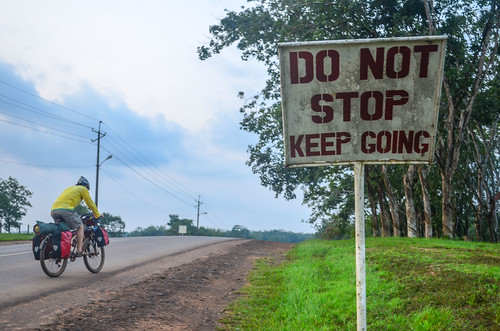
Close to night time, we leave the tar road of the plantation for track indicating a business college. Going straight would be going deeper in the rubber trees. We meet Daniel at the Trinity Bible College of Business Studies who kindly hosts us in the library. His father with 2 PhDs funded the college with his own funds and it looks pretty good. It is just across the road from Firestone, meaning that the villagers cannot use the Firestone bus system.
After a bucket shower outside and a discussion about education vs. number of children, I sleep next to chemistry and physics books and under a hanging periodic table of the elements, but sadly too tired to open any of them.
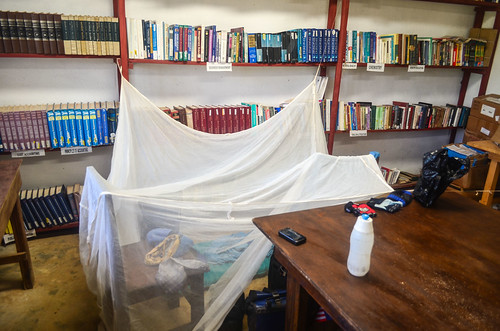
After a breakfast at a plantation gate, we continue our trip through the Firestone domain.
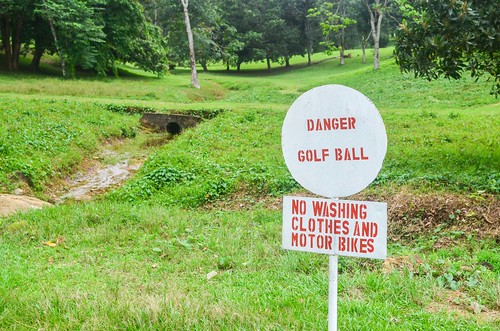
The latex is being collected from the trees. It is rather smelly and the grid of hevea trees is endless.
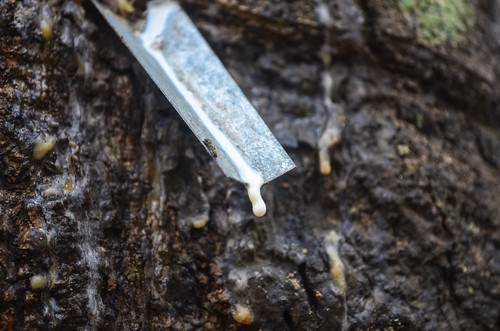

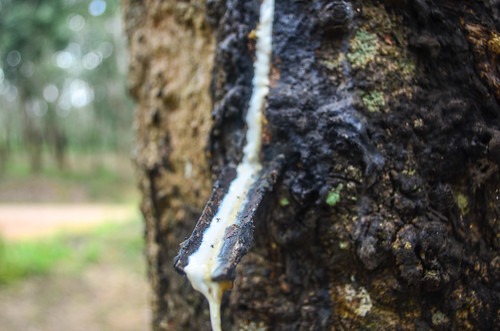
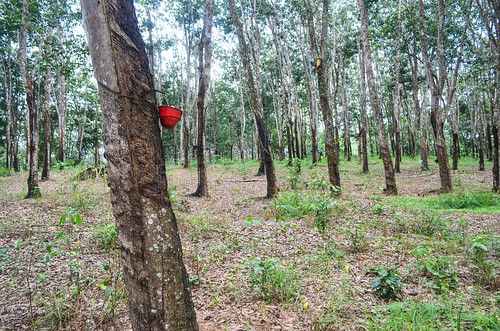
The plantation hides villages, bus stops, and latex collection points. It is a small country in itself. The schools are said to be good, and they look definitely better than a “normal” Liberian school. On the other hand, we met an old man with a broken leg (since the fall of a rubber tree in 2011) who received no compensation from the company. Its controversial contribution to the Liberian people can still be discussed.
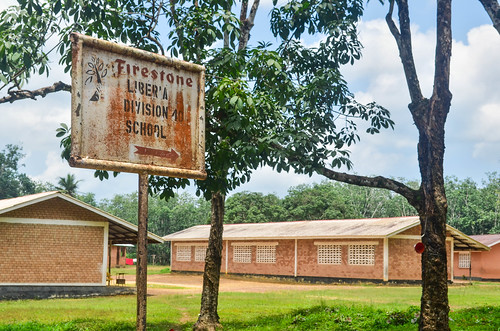
At one collection point, I meet Samuel (everybody has a name taken from the index of the Bible, so finally mine is “useful”) who shows me the collection process. Workers walk in with heavy buckets full of latex on their shoulders. The liquid is separated from the already solidified part, which is going towards the off grade container. The liquid really looks like milk while the solidified part could be mistaken for cottage cheese.
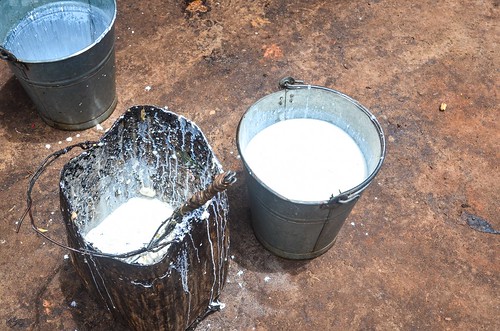
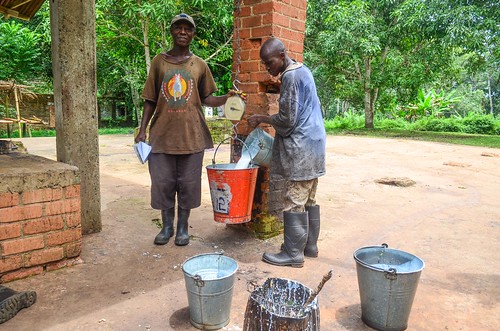
The liquid bucket is weighted and registered. And then dropped into the large steel container. When I ask about a small plastic bottle, they tell me to smell it, but “don’t try to drink it!“. I smell it and it burns my nose. It is pure ammonia. They pour a bit into the latex to keep it liquid.
I also burn my eyes just by looking over the main container, so I am done with the short visit. Now it makes sense why some of them wear safety goggles like in a chemistry lab. It is not only to look cool (although the motorbike-taxi pilots look cool with it).

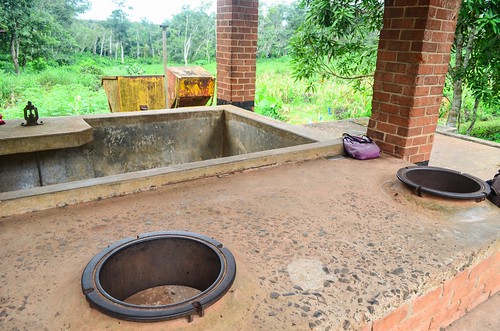
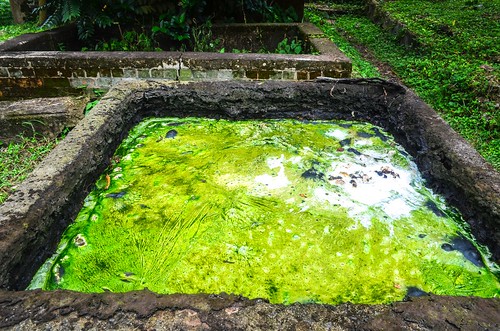

We are now out of the red track through the Firestone plantation and back on the tar road in Kakata. There are little rain showers in the afternoon. I have never heard and said as many “Wassup? Awrite!” as today. I am also systematically called “Chiniman! Chiniman!” … it is strange, are there Chinese around here?


We spend quite some time to find a deputy for the missing chief of the village in order to allow us to stay in the empty school we found in Salala district. It finally works OK and we are safe at night, just before the rain starts again.
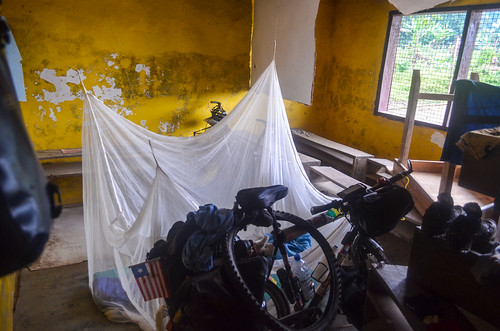
The next day starts again under the light rain. The road to Gbarnga is not so good, half OK, half destroyed, half mud.
The positive is that bananas are super cheap. We are right in the plantations. We are out of Firestone, but there are many “Firestone buying stations” by the road. There are still plenty of rubber trees, and people can bring their latex to those buying stations where the price of the day is written on a board.
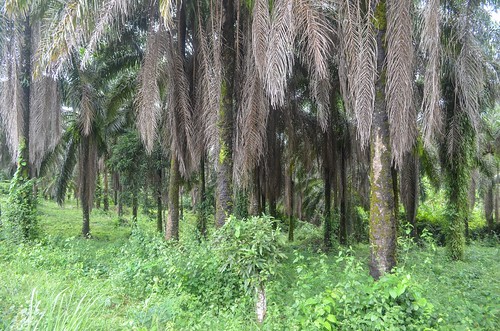
I would say that Liberia has the nicest kids so far. Always waving at us with a big smile, standing politely by the road, and with almost no begging for money or biscuits.
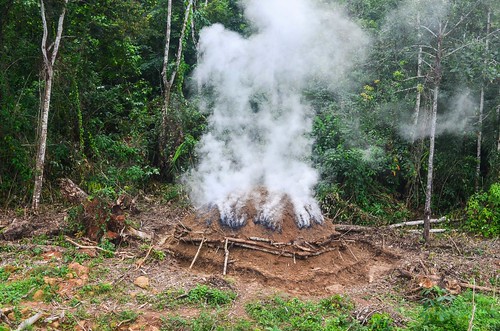
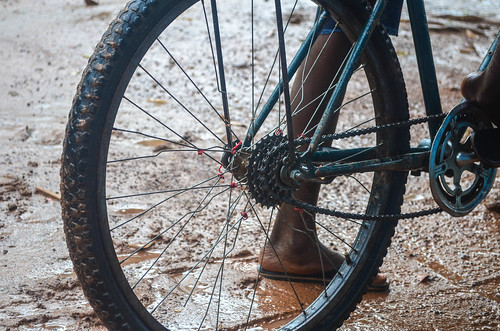
When about to reach Gbarnga (pronounced [banga]), we must decide where to spend the night. There is here the CARI, a center for agricultural research, which looks more like a Bangladeshi town with the flag of Bangladesh painted everywhere. The reason why we see Bangladeshis everywhere is because they are the biggest contributor to the UN peacekeeping troops, followed by Pakistan, which we saw regularly in Liberia as well. There is a Pakistani camp just across the road here too.
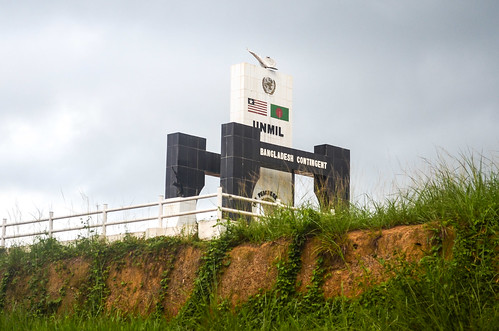
Among the camps of barbed wire is Mr. Yang and the Chinese agricultural research center. I met him shortly in Monrovia following the advice of Wang Boren, taken in the fire of the rebels at the Ivorian border.
And it is a big surprise when Roy welcome us in the center, not only to let us put our tents down, but to give us his room and to make a dinner with Absolut, Smirnoff, beer and a hot pot of delicious food grown on the same compound.
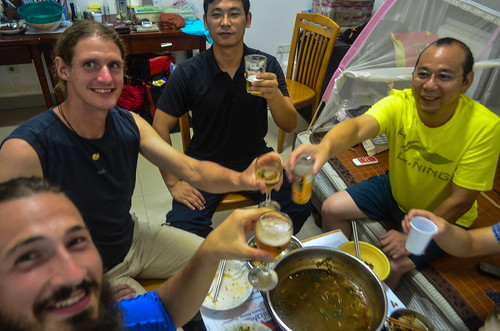
Those compounds with electricity, hot water and washing machines in the middle of jungle and modest villages are a relief! Even if actually, the conditions here are humble compared to what the UN expats enjoy.
To add more to the surprise, Roy has Alizée videos with Chinese subtitles downloaded from YouKu … she is still popular somewhere! He gives us also some of his antimalaria treatment the Chinese gave him for Africa. It is interesting as different from what we know (dihydroartemisin 40mg + piperaquine phosphate 0.32mg) and the treatment last only 2 days with 8 pills.

Roy offers us to stay one more day, and it makes a good decision since it rains all day, cancelling even the basketball game outside we were looking forward to. Besides the visit of the center, we have a Chinese lunch around the turntable with a taste of sugarcane alcohol, and dinner with the friendly staff of the Bangladeshi UN hospital, the neighbors.
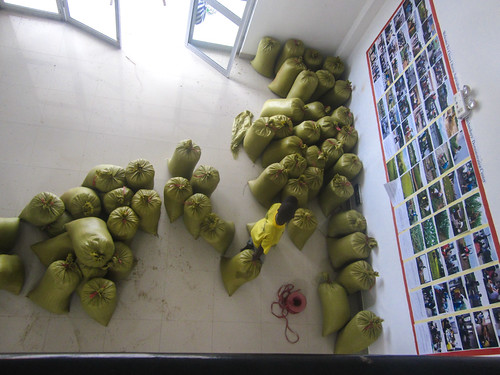
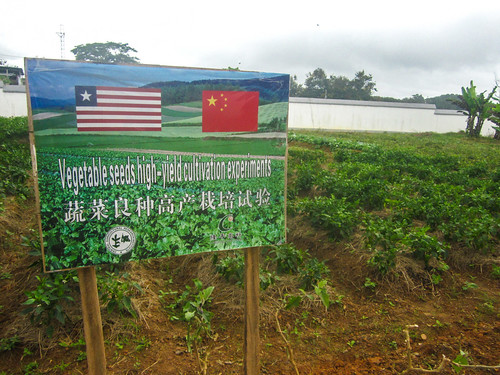
By the way, Wang is currently in Rabat trying his luck with the Europeans visas. Give a shout if you want to host a cyclist on a 10-year trip around the world.
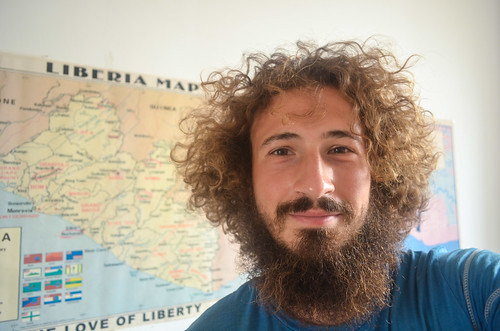
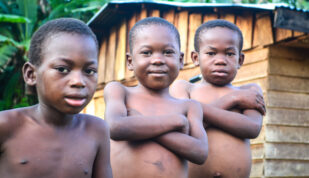

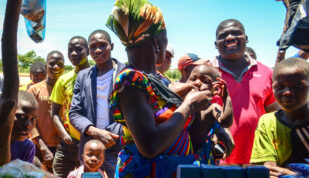



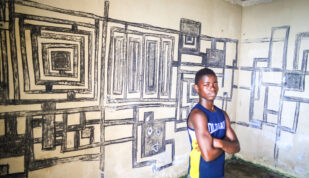
I really love this last photo JB :)))
Hello Jean-Baptiste!
I am also a touring cyclist, out on a 3 year trip around the world. For now I am in france and heading for africa in November.
Your blog and description of the dessert areas are priceless to me! So good and I now have a more stabil base to build my trip upon.
I just want to say big thanks and continue the great and epic journey you are on! ( I have only read as far as senegalese border, will contine to read soon)
Keep safe!
Alexander
Good luck!
Your SPOT doesn’t seem to update well on your website, but you’ll be in the best season for the desert and the west coast. Get ready for more adventure (and you should say hi to the swedish embassy people when you pass in monrovia).